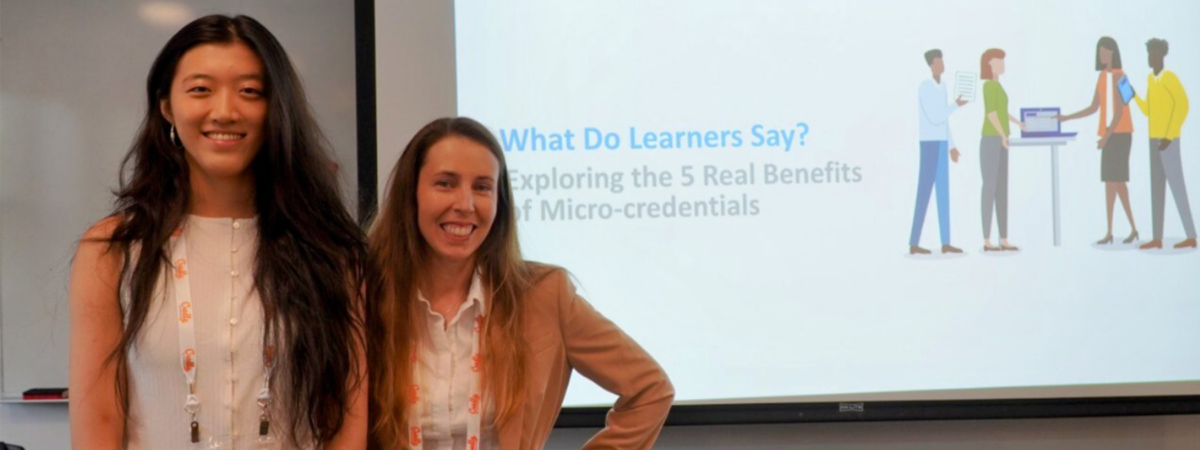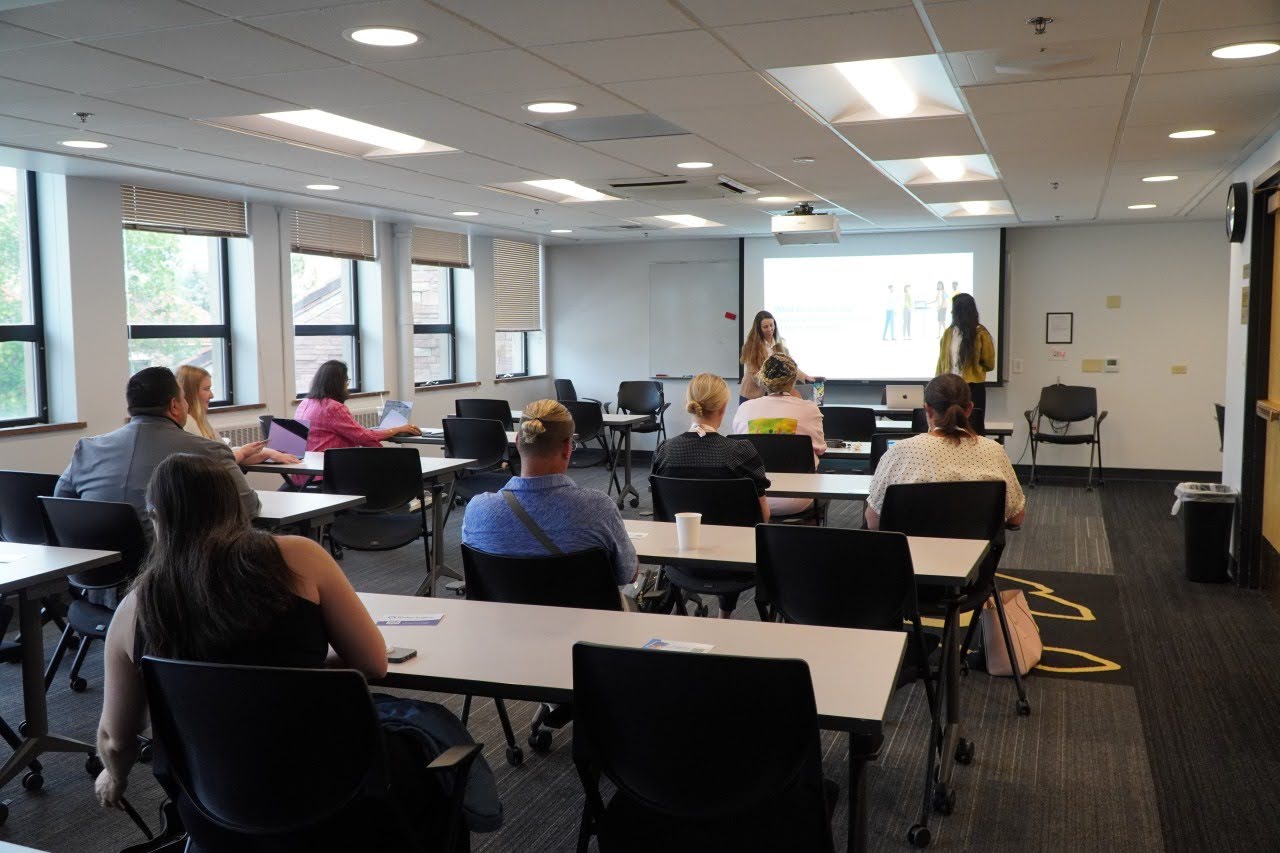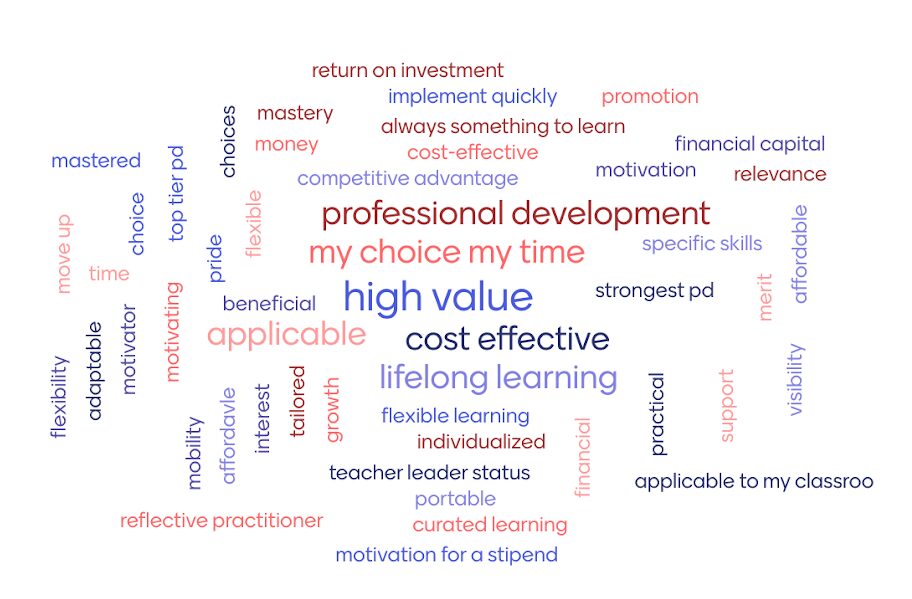
Discussions revolved around ensuring these technologies have the greatest impact while being used responsibly, while also reflecting what learners value most: affordability, agency, flexibility, and relevance. When we elevate learners’ voices in the design process of these technologies, they can open doors to advancement and empowerment for all. Badge Summit attendees left with actionable insights to support equitable and inclusive implementation or advancement of their technology initiatives.
Post-Summit Reflections
Below, members of our team share their post-summit reflections:
Keying Chen, Product Manager
This was my second time attending the Badge Summit, and it was an even richer learning experience than two years ago. One theme that especially stood out to me this year was intention. Earning a badge shouldn’t be an isolated event or the end of a learning process. When grounded in intention, badges can become a far more powerful part of a learner’s journey.
I heard a story from a colleague at the University of Phoenix about a student who earned a badge without even knowing there would be one. She later said that if she’d known, she would have chosen her courses more deliberately, and when she felt like giving up, thinking about the badge could have helped her stay motivated. This highlighted how visibility and awareness can transform a badge into a tool for planning and perseverance.
Another story came from a public policy student who had earned six micro-credentials in industry-specific tech skills. During a job interview with NASA, she was able to tell the story behind each one, sharing what she learned and how she planned to apply those skills. She got the job. It wasn’t about who issued the credentials, but how she reflected on them and used them to show her readiness to go above and beyond.
We’re still in the early days of realizing the full potential of micro-credentials. I’m left thinking:
There were also powerful examples of vision and equity, like using badges to recognize the skills of immigrant workers whose prior experience often goes unrecognized, or honoring the cultural knowledge of Indigenous communities that is undervalued in traditional workforce settings. As one participant put it beautifully, “for people’s unseen superpowers to be seen”, and I’m leaving this summit energized to keep doing that work.
Marilys Galindo, Senior Research Project Manager
This year’s Badge Summit theme was An Exploration of Micro-credentials, Access, and Equity. There were many sessions filled with insights, inspiration, and gratitude led by leaders in the digital credential space. An associate dean presenting at the summit stated, “I’ve learned, I’ve grown, and the world can see it.” We were reminded that skills need to be transparent and discoverable. Learning should be recognized wherever and whenever it happens, and barriers to validation of this learning should be eliminated. Also, we were reminded that LERs in and of themselves are a social technology that do not contribute to equity; rather, they reflect the beliefs, practices, and systems of the individuals and institutions that use them. It is up to the individuals and institutions that use this technology, and how they use it, to apply an equity lens to LERs.

(From left to right) Marilys Galind and Keying Chen during their session, “What Do Learners Say? Exploring the 5 Real Benefits of Micro-credentials.”
Our team presented an engaging session titled, “What Do Learners Say? Exploring the 5 Real Benefits of Micro-credentials,” sharing authentic stories and testimonials from high micro-credential earners and user experience research. During the session, we highlighted five compelling reasons why learners embraced micro-credentials for career growth, skill development, and personal fulfillment, including:
Session attendees heard the learners’ perspectives and how micro-credentials transformed their professional lives. Together, attendees created a word cloud representing words or short phrases to capture the benefits they heard from the learners’ testimonials. The words or phrases that stood out the most were: high value, professional development, my choice, my time, cost-effective, applicable, and lifelong learning. Attendees walked away inspired to reimagine their own micro-credential programs, focusing on the benefits and values that truly resonate with the learners.

Word cloud generated during the session, “What Do Learners Say? Exploring the 5 Real Benefits of Micro-credentials,” displaying words or phrases that stood out the most to the session attendees.
Additional team members presented during the Badge Summit’s virtual day. In “Competency-based Micro-credentials for Educators: A Case Study with Delaware Department of Education,” Ashley Miller, program manager, and Alyssa Moore, education associate from the Delaware Department of Education, discussed how they use competency-based micro-credentials as an integral part of their educator professional development strategy. They also touched on the history of the partnership between Digital Promise and the Delaware Department of Education, program goals, and findings from submissions and educator feedback that are helping shape the program.
In “From Competency to Credential: Badge Engine and Open-Source Digital Badging,” Keying Chen, product manager, and Kristen Franklin, director of product, introduced Digital Promise’s open-source badging solution, Badge Engine, focusing on how we are prioritizing equity, learner autonomy and control of data, sustainability and scalability, as well as adherence to 1EdTech’s Open Badges Standard V3.0. The session provided context for Badge Engine’s development, specific features and functionality, as well as suggestions for organizations that want to adopt and stand this up for their environment.
The mountains always provide the perfect backdrop for the Badge Summit, and the team is excited to return for the 11th annual gathering next year!
Digital Promise has been a pioneer in competency-based micro-credentials and has more than 10 years of experience in supporting organizations with their micro-credentialing needs. Check out this eBook, The Role of Micro-Credentials in Lifelong Learning and Development: Empowering Learners, Empowering Organizations, a comprehensive resource accessible to all interested in understanding micro-credentials. If you are interested in learning more about Digital Promise’s micro-credential services, please contact us at centerforlearnerpathways@digitalpromise.org.